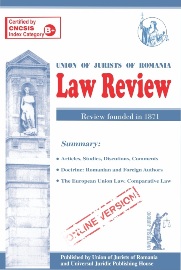EXTRAORDINARY RENDITION AND THE SECURITY PARADIGM
EXTRAORDINARY RENDITION AND THE SECURITY PARADIGM
Author(s): John A.E. VervaeleSubject(s): Law, Constitution, Jurisprudence, Criminal Law, Civil Law, International Law, Human Rights and Humanitarian Law, Public Law, Security and defense
Published by: Universul Juridic
Keywords: public law; Criminal Law; criminal justice; national security; extradition; rendition to justice; forcible abduction; extraordinary rendition;
Summary/Abstract: This paper deals with a very delicate subject – the extraordinary rendition. The analysis starts from the rendition to justice as a technique by which a suspected person is forcibly abducted in another State, if it is impossible to bring this suspect to stand trial by the normal extradition procedure. In these cases, the forcible abduction can be executed unilaterally by the agents of the forum State or with the cooperation of agents of the State where the person is abducted. The rendition in itself is not a judicial procedure because it lacks a judicial warrant and, in reality, is mostly a highly covert police or military operation, with the risk of infringing upon the State sovereignty of other States (depending on the cooperation with that State). Recently, the rendition to justice practice was applied in a systematic way in dealing with the prosecution of piracy in the Somalia-Gulf of Aden area. Several defendants ended up in criminal trials in European States without any extradition procedure at all. The rendition to justice was widened into a rendition to secure policy and in this way the extraordinary rendition was born. Extraordinary rendition is also a special administrative measure, but one that fundamentally changes the meaning of rendition, as the aim is no longer to adjudicate a person, but to keep him/her in secret detention for interrogation. In this context, the paper observes also the way extraordinary rendition is reflected in The Inter-American Court of Human Rights jurisprudence and in European Court of Human Rights standards.
Journal: Law Review
- Issue Year: 2013
- Issue No: 01
- Page Range: 34-51
- Page Count: 18
- Language: English
- Content File-PDF

